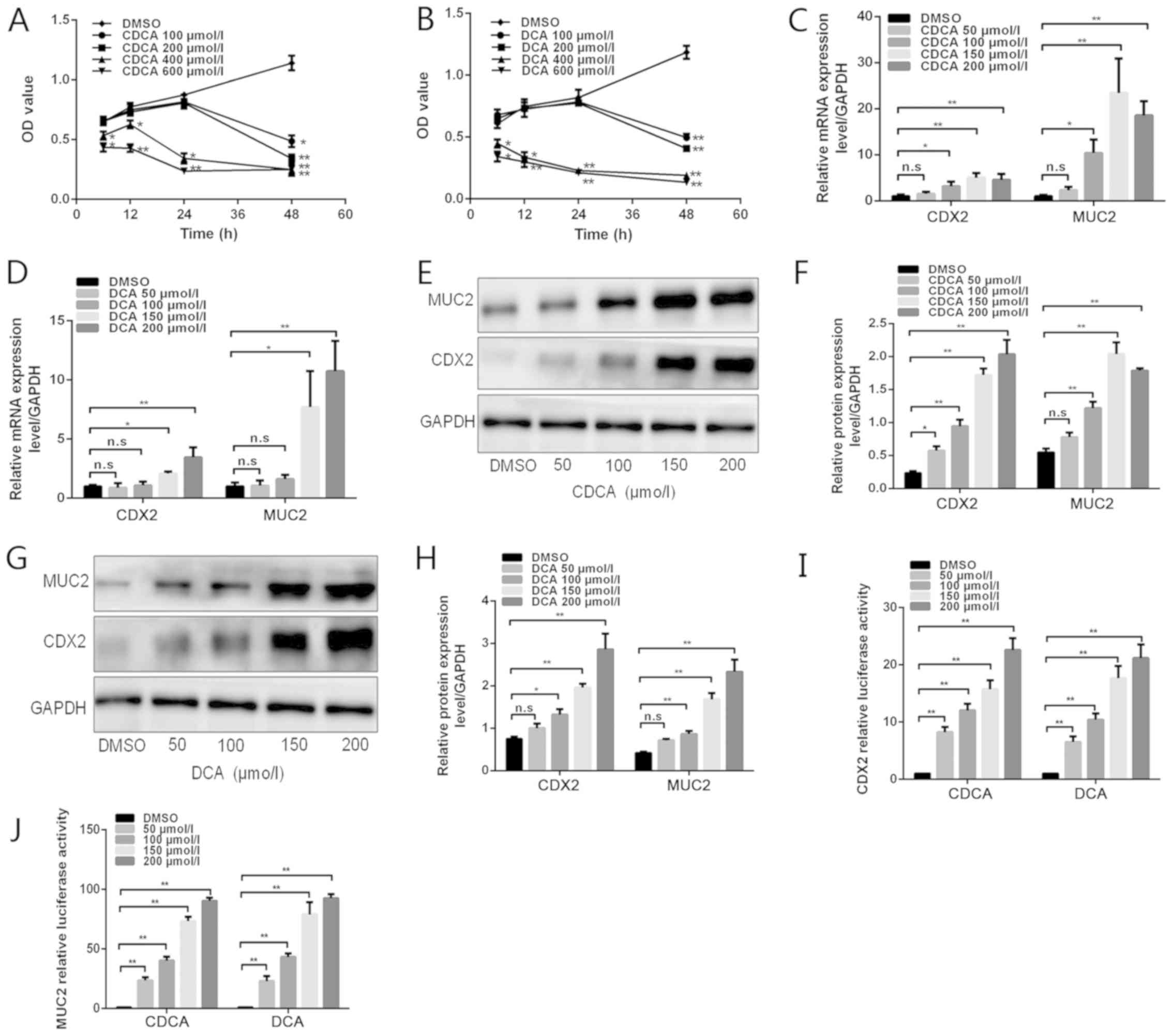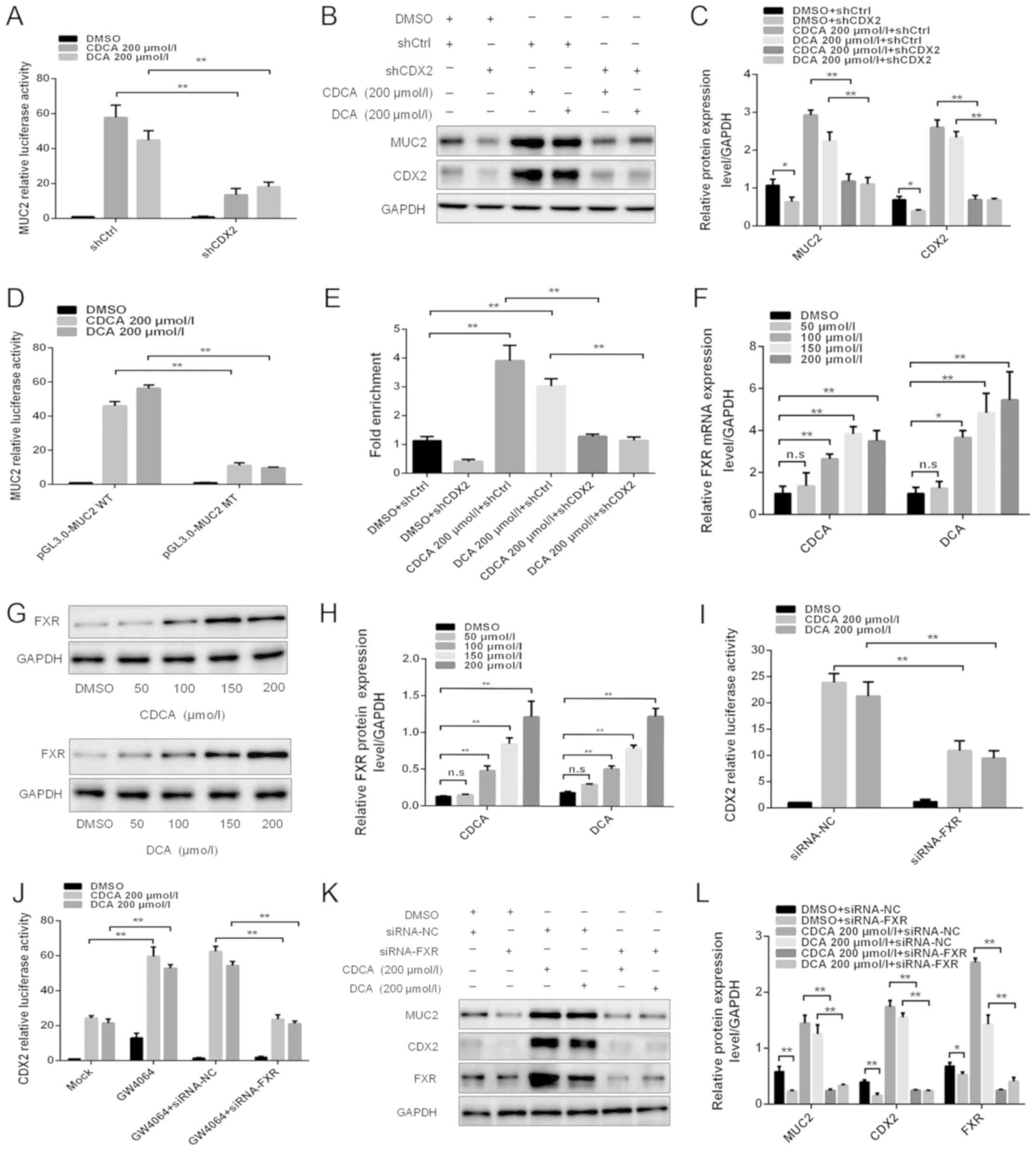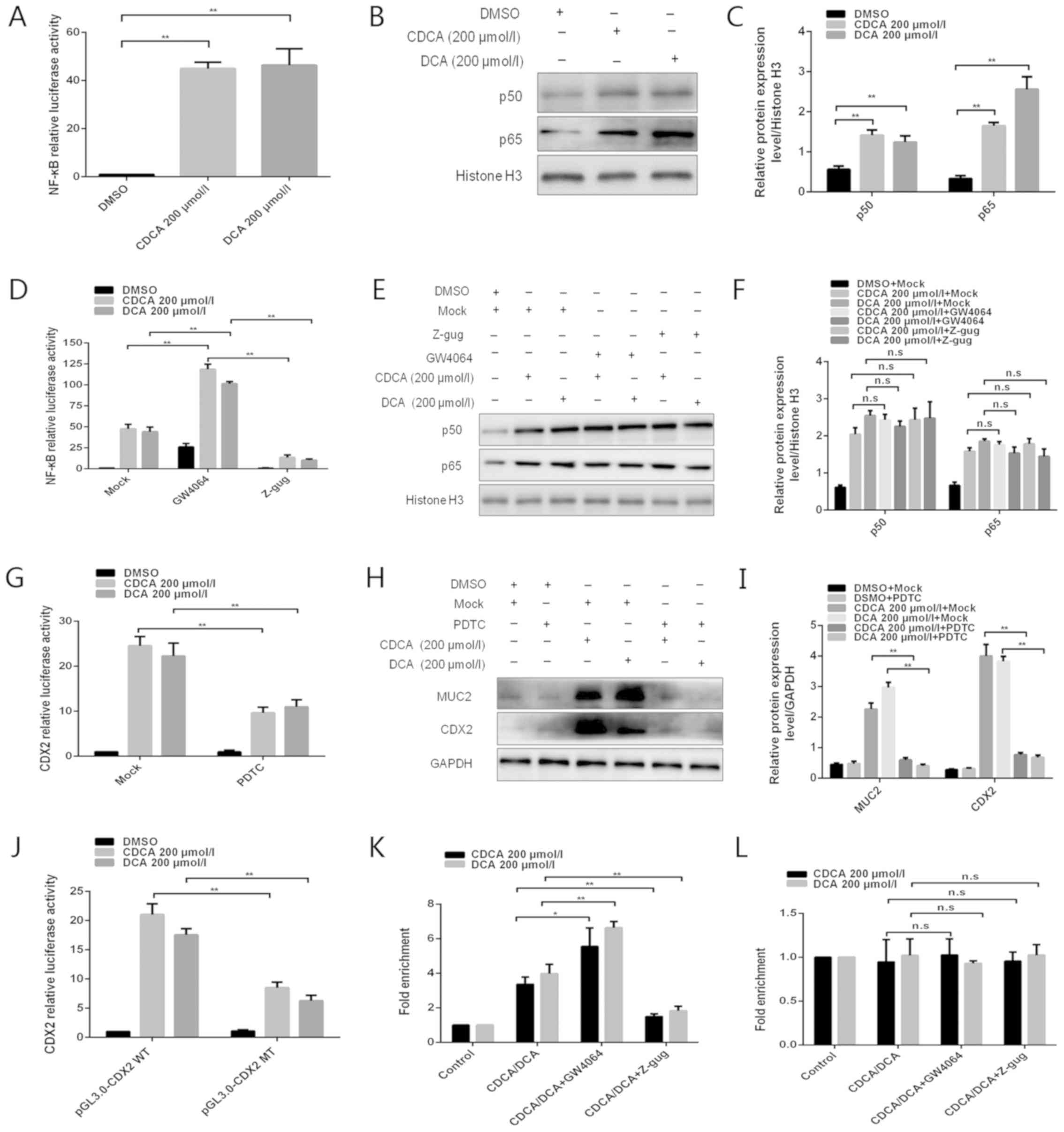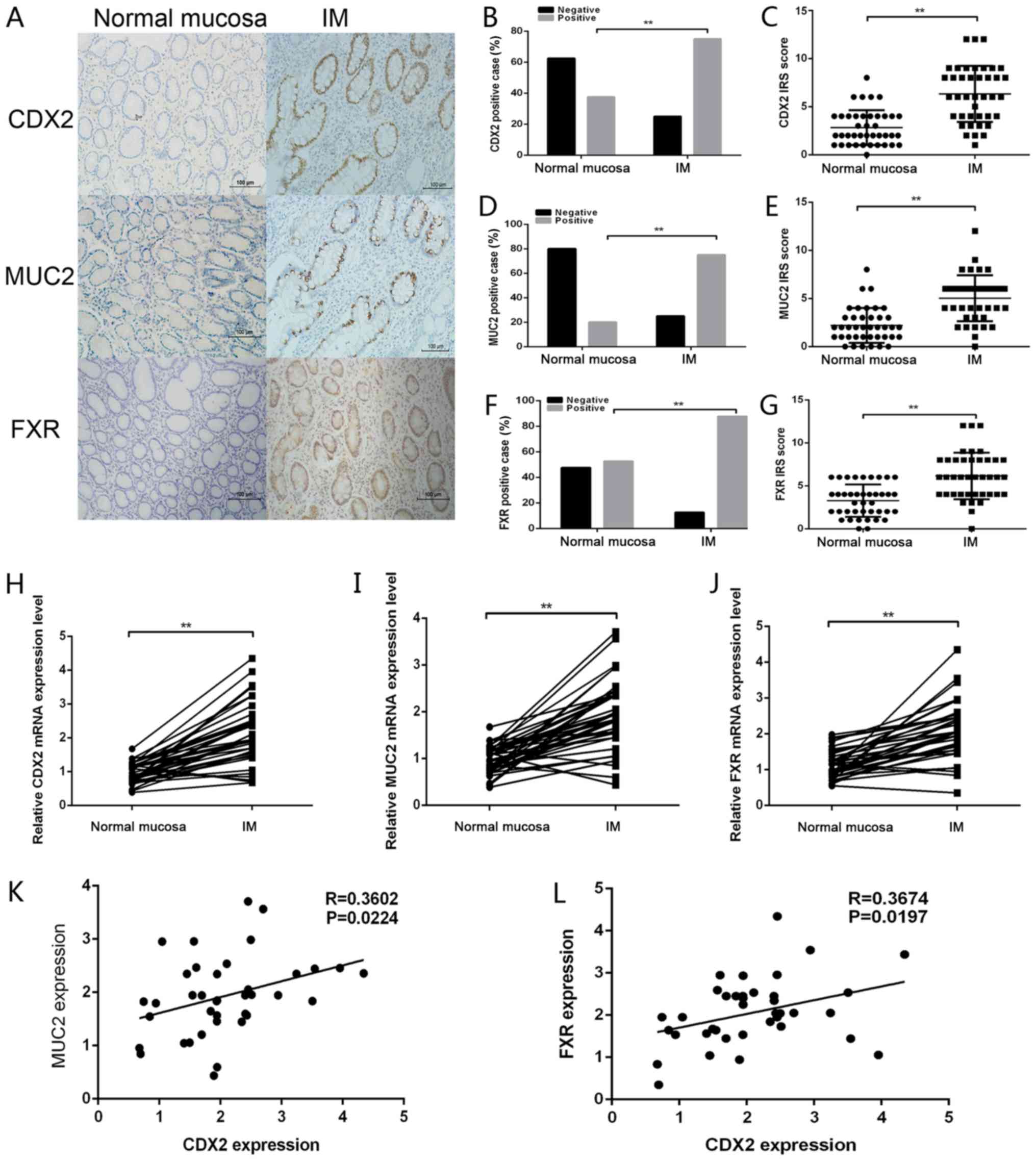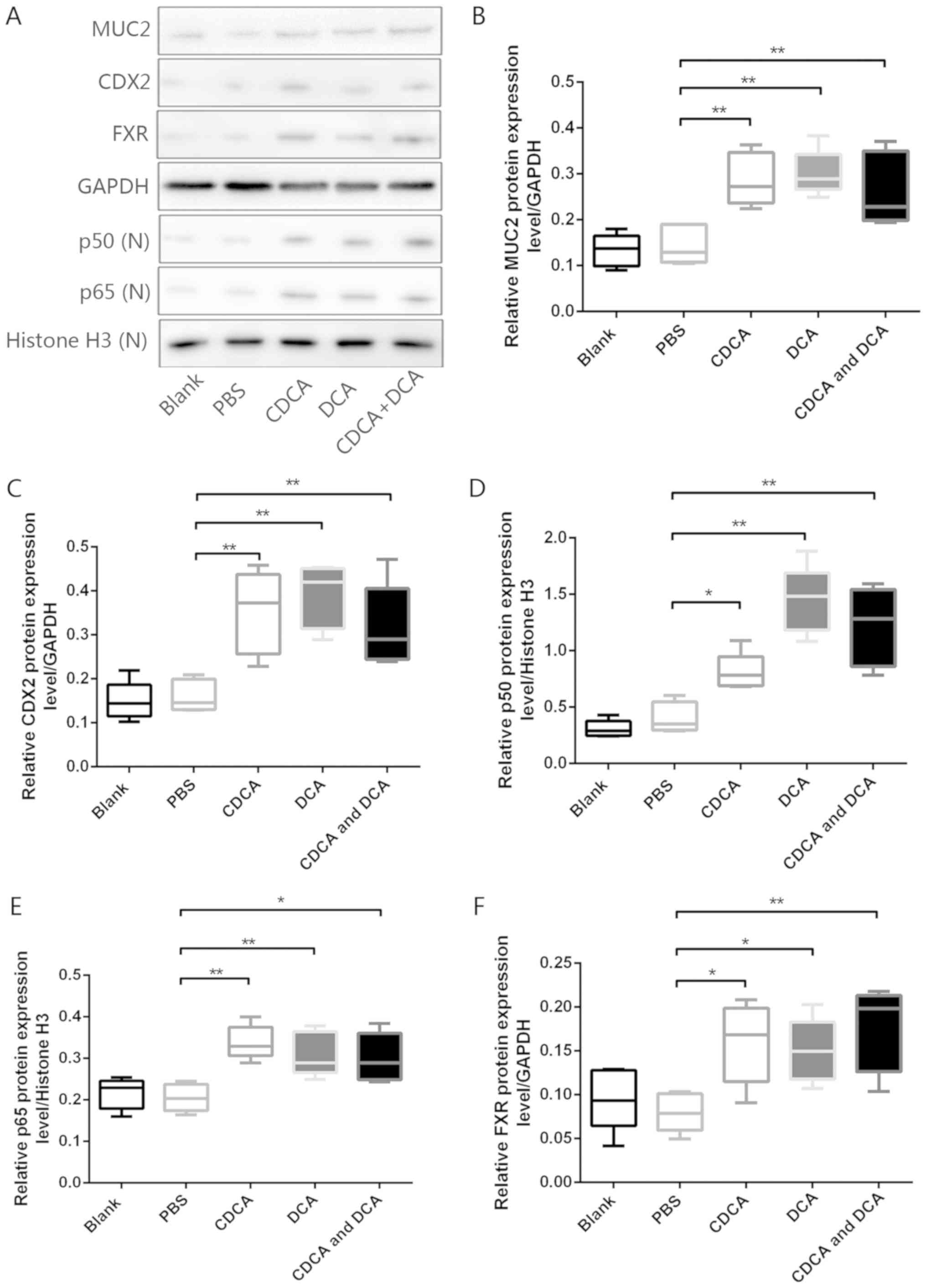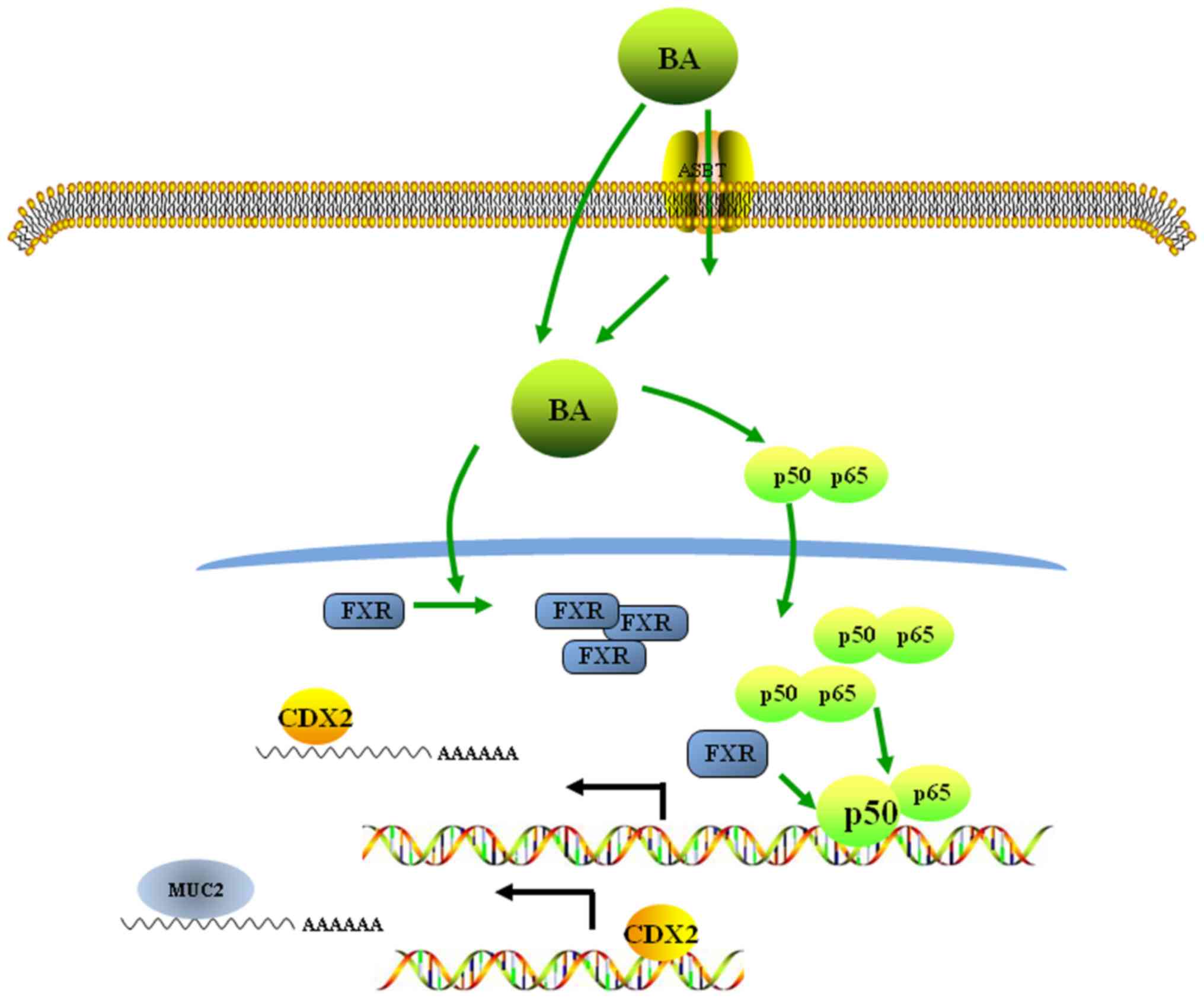|
1
|
Ferlay J, Soerjomataram I, Dikshit R, Eser
S, Mathers C, Rebelo M, Parkin DM, Forman D and Bray F: Cancer
incidence and mortality worldwide: Sources, methods and major
patterns in GLOBOCAN 2012. Int J Cancer. 136:E359–E386. 2015.
View Article : Google Scholar
|
|
2
|
Costamagna G and Cesaro P: Early gastric
cancer: Detection and endoscopic treatment. Ann Ital Chir.
83:183–191. 2012.PubMed/NCBI
|
|
3
|
Correa P and Piazuelo MB: The gastric
precancerous cascade. J Dig Dis. 13:2–9. 2012. View Article : Google Scholar :
|
|
4
|
Compare D, Rocco A and Nardone G:
Screening for and surveillance of gastric cancer. World J
Gastroenterol. 20:13681–13691. 2014. View Article : Google Scholar : PubMed/NCBI
|
|
5
|
Yamamoto H, Bai YQ and Yuasa Y:
Homeodomain protein CDX2 regulates goblet-specific MUC2 gene
expression. Biochem Biophys Res Commun. 300:813–818. 2003.
View Article : Google Scholar : PubMed/NCBI
|
|
6
|
Shimada T, Koike T, Yamagata M, Yoneda M
and Hiraishi H: Regulation of TFF3 expression by homeodomain
protein CDX2. Regul Pept. 140:81–87. 2007. View Article : Google Scholar
|
|
7
|
Liu Q, Teh M, Ito K, Shah N, Ito Y and
Yeoh KG: CDX2 expression is progressively decreased in human
gastric intestinal metaplasia, dysplasia and cancer. Modern
pathology: An official journal of the United States and Canadian
Academy of Pathology Inc. 20:1286–1297. 2007. View Article : Google Scholar : PubMed/NCBI
|
|
8
|
Eda A, Osawa H, Yanaka I, Satoh K, Mutoh
H, Kihira K and Sugano K: Expression of homeobox gene CDX2 precedes
that of CDX1 during the progression of intestinal metaplasia. J
Gastroenterol. 37:94–100. 2002. View Article : Google Scholar : PubMed/NCBI
|
|
9
|
Mutoh H, Hakamata Y, Sato K, Eda A, Yanaka
I, Honda S, Osawa H, Kaneko Y and Sugano K: Conversion of gastric
mucosa to intestinal metaplasia in Cdx2-expressing transgenic mice.
Biochem Biophys Res Commun. 294:470–479. 2002. View Article : Google Scholar : PubMed/NCBI
|
|
10
|
Lefebvre P, Cariou B, Lien F, Kuipers F
and Staels B: Role of bile acids and bile acid receptors in
metabolic regulation. Physiol Rev. 89:147–191. 2009. View Article : Google Scholar : PubMed/NCBI
|
|
11
|
Makishima M: Nuclear receptors as targets
for drug development: Regulation of cholesterol and bile acid
metabolism by nuclear receptors. J Pharmacol Sci. 97:177–183. 2005.
View Article : Google Scholar : PubMed/NCBI
|
|
12
|
Redinger RN: The role of the enterohepatic
circulation of bile salts and nuclear hormone receptors in the
regulation of cholesterol homeostasis: Bile salts as ligands for
nuclear hormone receptors. Can J Gastroenterol. 17:265–271. 2003.
View Article : Google Scholar : PubMed/NCBI
|
|
13
|
Modica S, Murzilli S, Salvatore L, Schmidt
DR and Moschetta A: Nuclear bile acid receptor FXR protects against
intestinal tumorigenesis. Cancer Res. 68:9589–9594. 2008.
View Article : Google Scholar : PubMed/NCBI
|
|
14
|
Maran RR, Thomas A, Roth M, Sheng Z,
Esterly N, Pinson D, Gao X, Zhang Y, Ganapathy V, Gonzalez FJ, et
al: Farnesoid X receptor deficiency in mice leads to increased
intestinal epithelial cell proliferation and tumor development. J
Pharmacol Exp Ther. 328:469–477. 2009. View Article : Google Scholar :
|
|
15
|
Ku HJ, Kim HY, Kim HH, Park HJ and Cheong
JH: Bile acid increases expression of the histamine-producing
enzyme, histidine decarboxylase, in gastric cells. World J
Gastroenterol. 20:175–182. 2014. View Article : Google Scholar : PubMed/NCBI
|
|
16
|
Sobala GM, O'Connor HJ, Dewar EP, King RF,
Axon AT and Dixon MF: Bile reflux and intestinal metaplasia in
gastric mucosa. J Clin Pathol. 46:235–240. 1993. View Article : Google Scholar : PubMed/NCBI
|
|
17
|
Dixon MF, Mapstone NP, Neville PM,
Moayyedi P and Axon AT: Bile reflux gastritis and intestinal
metaplasia at the cardia. Gut. 51:351–355. 2002. View Article : Google Scholar : PubMed/NCBI
|
|
18
|
Tatsugami M, Ito M, Tanaka S, Yoshihara M,
Matsui H, Haruma K and Chayama K: Bile acid promotes intestinal
metaplasia and gastric carcinogenesis. Cancer Epidemiol Biomarkers
Prev. 21:2101–2107. 2012. View Article : Google Scholar : PubMed/NCBI
|
|
19
|
Jiang JX, Liu Q, Zhao B, Zhang HH, Sang
HM, Djaleel SM, Zhang GX and Xu SF: Risk factors for intestinal
metaplasia in a southeastern Chinese population: An analysis of
28,745 cases. J Cancer Res Clin Oncol. 143:409–418. 2017.
View Article : Google Scholar
|
|
20
|
Tamagawa Y, Ishimura N, Uno G, Aimi M,
Oshima N, Yuki T, Sato S, Ishihara S and Kinoshita Y: Bile acids
induce Delta-like 1 expression via Cdx2-dependent pathway in the
development of Barrett's esophagus. Lab Invest. 96:325–337. 2016.
View Article : Google Scholar
|
|
21
|
Xu Y, Watanabe T, Tanigawa T, Machida H,
Okazaki H, Yamagami H, Watanabe K, Tominaga K, Fujiwara Y, Oshitani
N, et al: Bile acids induce cdx2 expression through the farnesoid x
receptor in gastric epithelial cells. J Clin Biochem Nutr.
46:81–86. 2010. View Article : Google Scholar : PubMed/NCBI
|
|
22
|
Livak KJ and Schmittgen TD: Analysis of
relative gene expression data using real-time quantitative PCR and
the 2(-Delta Delta C(T)) method. Methods. 25:402–408. 2001.
View Article : Google Scholar
|
|
23
|
Qin R, Wang NN, Chu J and Wang X:
Expression and significance of homeodomain protein Cdx2 in gastric
carcinoma and precancerous lesions. World J Gastroenterol.
18:3296–3302. 2012.PubMed/NCBI
|
|
24
|
Chen Q, Zheng PS and Yang WT:
EZH2-mediated repression of GSK-3β and TP53 promotes Wnt/β-catenin
signaling-dependent cell expansion in cervical carcinoma.
Oncotarget. 7:36115–36129. 2016.PubMed/NCBI
|
|
25
|
Kauer WK, Peters JH, DeMeester TR,
Feussner H, Ireland AP, Stein HJ and Siewert RJ: Composition and
concentration of bile acid reflux into the esophagus of patients
with gastroesophageal reflux disease. Surgery. 122:874–881. 1997.
View Article : Google Scholar : PubMed/NCBI
|
|
26
|
Liu T, Zhang X, So CK, Wang S, Wang P, Yan
L, Myers R, Chen Z, Patterson AP, Yang CS, et al: Regulation of
Cdx2 expression by promoter methylation, and effects of Cdx2
transfection on morphology and gene expression of human esophageal
epithelial cells. Carcinogenesis. 28:488–496. 2007. View Article : Google Scholar
|
|
27
|
Huo X, Zhang HY, Zhang XI, Lynch JP,
Strauch ED, Wang JY, Melton SD, Genta RM, Wang DH, Spechler SJ, et
al: Acid and bile salt-induced CDX2 expression differs in
esophageal squamous cells from patients with and without Barrett's
esophagus. Gastroenterology. 139:194–203.e1. 2010. View Article : Google Scholar : PubMed/NCBI
|
|
28
|
Merga YJ, O'Hara A, Burkitt MD, Duckworth
CA, Probert CS, Campbell BJ and Pritchard DM: Importance of the
alternative NF-κB activation pathway in inflammation-associated
gastrointestinal carcinogenesis. Am J Physiol Gastrointest Liver
Physiol. 310:G1081–G1090. 2016. View Article : Google Scholar : PubMed/NCBI
|
|
29
|
Gambhir S, Vyas D, Hollis M, Aekka A and
Vyas A: Nuclear factor kappa B role in inflammation associated
gastrointestinal malignancies. World J Gastroenterol. 21:3174–3183.
2015. View Article : Google Scholar : PubMed/NCBI
|
|
30
|
Wang YD, Chen WD, Wang M, Yu D, Forman BM
and Huang W: Farnesoid X receptor antagonizes nuclear factor kappaB
in hepatic inflammatory response. Hepatology. 48:1632–1643. 2008.
View Article : Google Scholar : PubMed/NCBI
|
|
31
|
Kim S, Domon-Dell C, Wang Q, Chung DH, Di
Cristofano A, Pandolfi PP, Freund JN and Evers BM: PTEN and
TNF-alpha regulation of the intestinal-specific Cdx-2 homeobox gene
through a PI3K, PKB/Akt, and NF-appaB-dependent pathway.
Gastroenterology. 123:1163–1178. 2002. View Article : Google Scholar : PubMed/NCBI
|
|
32
|
Chen BJ, Zeng S, Xie R, Hu CJ, Wang SM, Wu
YY, Xiao YF and Yang SM: hTERT promotes gastric intestinal
metaplasia by upregulating CDX2 via NF-κB signaling pathway.
Oncotarget. 8:26969–26978. 2017.PubMed/NCBI
|
|
33
|
Vageli DP, Prasad ML and Sasaki CT:
Gastro-duodenal fluid induced nuclear factor-kappaB activation and
early pre-malignant alterations in murine hypopharyngeal mucosa.
Oncotarget. 7:5892–5908. 2016. View Article : Google Scholar : PubMed/NCBI
|
|
34
|
Spence AD, Cardwell CR, McMenamin UC,
Hicks BM, Johnston BT, Murray LJ and Coleman HG: Adenocarcinoma
risk in gastric atrophy and intestinal metaplasia: A systematic
review. BMC Gastroenterol. 17:1572017. View Article : Google Scholar : PubMed/NCBI
|
|
35
|
Matsuhisa T, Arakawa T, Watanabe T,
Tokutomi T, Sakurai K, Okamura S, Chono S, Kamada T, Sugiyama A,
Fujimura Y, et al: Relation between bile acid reflux into the
stomach and the risk of atrophic gastritis and intestinal
metaplasia: a multicenter study of 2283 cases. Dig Endosc.
25:519–525. 2013. View Article : Google Scholar : PubMed/NCBI
|
|
36
|
Silberg DG, Sullivan J, Kang E, Swain GP,
Moffett J, Sund NJ, Sackett SD and Kaestner KH: Cdx2 ectopic
expression induces gastric intestinal metaplasia in transgenic
mice. Gastroenterology. 122:689–696. 2002. View Article : Google Scholar : PubMed/NCBI
|
|
37
|
Boudreau F, Rings EH, van Wering HM, Kim
RK, Swain GP, Krasinski SD, Moffett J, Grand RJ, Suh ER and Traber
PG: Hepatocyte nuclear factor-1 alpha, GATA-4, and caudal related
homeodomain protein Cdx2 interact functionally to modulate
intestinal gene transcription. Implication for the developmental
regulation of the sucrase-isomaltase gene. J Biol Chem.
277:31909–31917. 2002. View Article : Google Scholar : PubMed/NCBI
|
|
38
|
Debruyne PR, Witek M, Gong L, Birbe R,
Chervoneva I, Jin T, Domon-Cell C, Palazzo JP, Freund JN, Li P, et
al: Bile acids induce ectopic expression of intestinal guanylyl
cyclase C Through nuclear factor-kappaB and Cdx2 in human
esophageal cells. Gastroenterology. 130:1191–1206. 2006. View Article : Google Scholar : PubMed/NCBI
|
|
39
|
Wu J, Gong J, Geng J and Song Y:
Deoxycholic acid induces the overexpression of intestinal mucin,
MUC2, via NF-kB signaling pathway in human esophageal
adenocarcinoma cells. BMC Cancer. 8:3332008. View Article : Google Scholar : PubMed/NCBI
|
|
40
|
Lee HY, Crawley S, Hokari R, Kwon S and
Kim YS: Bile acid regulates MUC2 transcription in colon cancer
cells via positive EGFR/PKC/Ras/ERK/CREB,
PI3K/Akt/IkappaB/NF-kappaB and p38/MSK1/CREB pathways and negative
JNK/c-Jun/AP-1 pathway. Int J Oncol. 36:941–953. 2010.PubMed/NCBI
|
|
41
|
Yuan ZQ and Li KW: Role of farnesoid X
receptor in cholestasis. J Dig Dis. 17:501–509. 2016. View Article : Google Scholar : PubMed/NCBI
|
|
42
|
Dong B, Young M, Liu X, Singh AB and Liu
J: Regulation of lipid metabolism by obeticholic acid in
hyperlipidemic hamsters. J Lipid Res. 58:350–363. 2017. View Article : Google Scholar :
|
|
43
|
Lax S, Schauer G, Prein K, Kapitan M,
Silbert D, Berghold A, Berger A and Trauner M: Expression of the
nuclear bile acid receptor/farnesoid X receptor is reduced in human
colon carcinoma compared to nonneoplastic mucosa independent from
site and may be associated with adverse prognosis. Int J Cancer.
130:2232–2239. 2012. View Article : Google Scholar
|
|
44
|
Liu J, Tong SJ, Wang X and Qu LX:
Farnesoid X receptor inhibits LNcaP cell proliferation via the
upregulation of PTEN. Exp Ther Med. 8:1209–1212. 2014. View Article : Google Scholar : PubMed/NCBI
|
|
45
|
Giordano C, Barone I, Vircillo V, Panza S,
Malivindi R, Gelsomino L, Pellegrino M, Rago V, Mauro L, Lanzino M,
et al: Activated FXR Inhibits Leptin Signaling and Counteracts
Tumor-promoting Activities of Cancer-Associated Fibroblasts in
Breast Malignancy. Sci Rep. 6:217822016. View Article : Google Scholar : PubMed/NCBI
|
|
46
|
De Gottardi A: Dumonceau JM, Bruttin F,
Vonlaufen A, Morard I, Spahr L, Rubbia-Brandt L, Frossard JL,
Dinjens WN, Rabinovitch PS, et al Expression of the bile acid
receptor FXR in Barrett's esophagus and enhancement of apoptosis by
guggulsterone in vitro. Mol Cancer. 5:482006. View Article : Google Scholar : PubMed/NCBI
|
|
47
|
Li S, Chen X, Zhou L and Wang BM:
Farnesoid X receptor signal is involved in deoxycholic acid-induced
intestinal metaplasia of normal human gastric epithelial cells.
Oncol Rep. 34:2674–2682. 2015. View Article : Google Scholar : PubMed/NCBI
|
|
48
|
Yamada T, Osawa S, Hamaya Y, Furuta T,
Hishida A, Kajimura M and Ikuma M: Guggulsterone suppresses bile
acid-induced and constitutive caudal-related homeobox 2 expression
in gut-derived adenocarcinoma cells. Anticancer Res. 30:1953–1960.
2010.PubMed/NCBI
|
|
49
|
Lian F, Xing X, Yuan G, Schäfer C, Rauser
S, Walch A, Röcken C, Ebeling M, Wright MB, Schmid RM, et al:
Farnesoid X receptor protects human and murine gastric epithelial
cells against inflammation-induced damage. Biochem J. 438:315–323.
2011. View Article : Google Scholar : PubMed/NCBI
|
|
50
|
Zollner G, Wagner M, Moustafa T, Fickert
P, Silbert D, Gumhold J, Fuchsbichler A, Halilbasic E, Denk H,
Marschall HU, et al: Coordinated induction of bile acid
detoxification and alternative elimination in mice: Role of
FXR-regulated organic solute transporter-alpha/beta in the adaptive
response to bile acids. Am J Physiol Gastrointest Liver Physiol.
290:G923–G932. 2006. View Article : Google Scholar
|
|
51
|
Sarkar FH, Li Y, Wang Z and Kong D:
NF-kappaB signaling pathway and its therapeutic implications in
human diseases. Int Rev Immunol. 27:293–319. 2008. View Article : Google Scholar : PubMed/NCBI
|
|
52
|
Abdel-Latif MM, Inoue H, Kelleher D and
Reynolds JV: Factors regulating nuclear factor-kappa B activation
in esophageal cancer cells: Role of bile acids and acid. J Cancer
Res Ther. 12:364–373. 2016. View Article : Google Scholar : PubMed/NCBI
|
|
53
|
Lee JY, Lee KT, Lee JK, Lee KH, Jang KT,
Heo JS, Choi SH, Kim Y and Rhee JC: Farnesoid X receptor,
overexpressed in pancreatic cancer with lymph node metastasis
promotes cell migration and invasion. Br J Cancer. 104:1027–1037.
2011. View Article : Google Scholar : PubMed/NCBI
|
|
54
|
Gadaleta RM, Oldenburg B, Willemsen EC,
Spit M, Murzilli S, Salvatore L, Klomp LW, Siersema PD, van Erpecum
KJ and van Mil SW: Activation of bile salt nuclear receptor FXR is
repressed by pro-inflammatory cytokines activating NF-κB signaling
in the intestine. Biochim Biophys Acta. 1812:851–858. 2011.
View Article : Google Scholar : PubMed/NCBI
|
|
55
|
Kazumori H, Ishihara S, Rumi MA, Kadowaki
Y and Kinoshita Y: Bile acids directly augment caudal related
homeobox gene Cdx2 expression in oesophageal keratinocytes in
Barrett's epithelium. Gut. 55:16–25. 2006. View Article : Google Scholar
|















